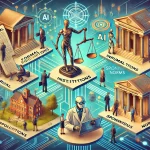
AI Trends Today: The Latest Breakthroughs, Investments, and Ethical Challenges
March 27, 2025AI Trends Today: The Latest Breakthroughs, Investments, and Ethical Challenges (March 27, 2025)
Artificial intelligence continues to advance at a breathtaking pace, shaping industries, redefining user experiences, and sparking ethical debates. From record-breaking funding rounds to controversial AI filters, today’s biggest AI stories highlight the field’s rapid transformation. Here’s a deep dive into the latest developments:
🚀 OpenAI’s $40 Billion Funding Round Nears Completion
OpenAI is reportedly finalizing a $40 billion funding round, led by SoftBank, marking one of the largest AI investments in history. This funding would provide OpenAI with the resources to expand its AI models, computing power, and real-world applications.
Why It Matters:
The deal underscores the continuing AI investment boom, with OpenAI remaining one of the dominant players in the field.
The capital injection will likely fuel advancements in large language models (LLMs), robotics, and AI-powered enterprise solutions.
SoftBank’s involvement signals increased interest in AI-driven automation and its integration into telecom, robotics, and cloud computing.
As AI technology becomes increasingly embedded in everyday life, OpenAI’s latest funding round could pave the way for new AI-driven tools, including more advanced conversational agents, coding assistants, and multimodal models.
🎥 Google’s AI Leap: Real-Time Video in Gemini
Google is making a major stride in AI development by integrating real-time video capabilities into its Gemini model. This enhancement aims to make Gemini more competitive with OpenAI’s GPT-4 and upcoming AI models from competitors like Anthropic and Meta.
What This Means for AI Development:
Google’s Gemini will be able to process and analyze live video feeds, potentially revolutionizing video-based AI applications, security surveillance, autonomous driving, and content moderation.
This marks a shift from static text-based AI models to dynamic, real-time AI interactions.
The update is expected to impact industries such as journalism, healthcare, and social media, where video content plays a dominant role.
With AI gaining the ability to understand and respond to video in real time, we may soon see more sophisticated AI assistants capable of interpreting live events, offering real-time translations, or enhancing digital media experiences.
📱 Perplexity’s Bid for TikTok
Perplexity, an AI-powered search platform, is making another attempt to acquire TikTok. The proposed acquisition aims to integrate AI-driven enhancements into the platform, potentially reshaping content discovery, recommendations, and user engagement.
The AI-Social Media Connection:
AI companies are increasingly targeting social media platforms to extend their reach and refine AI-powered content curation.
If successful, Perplexity could leverage AI to personalize TikTok’s algorithm beyond its current capabilities, improving search accuracy and user engagement.
The move highlights a growing intersection between AI and social media, where AI-enhanced recommendation engines can drive even more engagement and ad revenue.
Given TikTok’s global influence, AI-driven optimizations could change the way users interact with the platform, from smarter content curation to AI-powered video generation.
💾 FuriosaAI Rejects Meta’s $800M Offer
FuriosaAI, an emerging AI chipmaker, has reportedly turned down an $800 million acquisition bid from Meta. This decision signals a push for independence in the highly competitive AI hardware sector.
Why This is a Big Deal:
AI chip development is becoming increasingly competitive, with companies like NVIDIA, AMD, and Google developing custom AI chips for deep learning and cloud computing.
FuriosaAI’s rejection of Meta’s offer suggests that smaller chipmakers are positioning themselves to compete independently rather than being acquired by tech giants.
This move could lead to greater innovation in AI hardware, as smaller firms focus on specialized AI chips tailored for different industries.
As AI models grow more complex, custom AI chips are becoming a necessity, driving intense competition among tech giants and startups alike.
🛍 AI in Retail: Smart Meal Planning at Chadstone
Melbourne’s Chadstone Shopping Centre has introduced an AI-powered Food Concierge, designed to assist customers in meal planning by suggesting recipes and directing them to purchase the necessary ingredients.
Why It’s Significant:
This AI tool aims to enhance shopping efficiency by offering personalized meal plans based on dietary preferences.
It also seeks to reduce food waste by suggesting recipes that make better use of available ingredients.
Retailers are increasingly adopting AI to improve the shopping experience, from smart assistants to AI-driven pricing strategies.
This trend reflects the broader integration of AI in everyday consumer experiences, making shopping more personalized and efficient.
🏗 Is There an AI Data Center Bubble?
Alibaba’s chairman Joe Tsai has raised concerns about a potential bubble in AI data center investments, questioning whether companies are over-investing in AI infrastructure without guaranteed future demand.
Key Takeaways:
Major tech firms are investing billions in AI-specific data centers, but there’s uncertainty over how soon they will see profitable returns.
Cloud computing and AI models require massive processing power, but some experts warn that the current spending frenzy could be unsustainable.
If demand doesn’t keep pace, we could see a downturn similar to previous tech investment bubbles.
While AI is advancing rapidly, the long-term sustainability of AI infrastructure spending remains a key concern for investors.
😨 TikTok’s Controversial ‘Chubby’ Filter
A new AI-powered filter on TikTok that alters users’ appearances to make them look “chubbier” has sparked backlash, with critics arguing that it promotes body shaming and negative self-image.
Why This Matters:
AI-generated beauty filters have long been criticized for reinforcing unrealistic body standards.
Users have voiced concerns that such filters contribute to self-esteem issues, particularly among younger audiences.
This highlights the ethical concerns surrounding AI’s role in shaping online beauty standards.
As AI-driven filters become more advanced, the ethical implications of their impact on mental health and self-perception continue to spark debate.
🧠 Google Unveils Gemini 2.5 Pro
Google has launched Gemini 2.5 Pro, describing it as its most advanced AI model to date. This follows its previous Gemini 2.0 release, further strengthening Google’s AI capabilities.
What’s New in Gemini 2.5 Pro?
Improved reasoning, problem-solving, and multimodal capabilities.
Enhanced speed and efficiency, making it more powerful for both enterprise and consumer applications.
Further competition with OpenAI’s upcoming AI models, as companies race to create the most intelligent AI systems.
With AI models rapidly evolving, the race to develop more powerful, efficient, and generalizable AI continues to intensify.
🌎 AI Bots Overwhelming Open-Source Projects
Developers are reporting that AI crawlers now make up 97% of traffic on some open-source platforms, leading to rising server costs and forcing some developers to block access from entire countries.
Why This is a Concern:
AI models rely on scraping open-source data for training, but excessive bot traffic is straining resources for developers.
Some projects are being forced to implement traffic restrictions, potentially limiting AI’s access to valuable data.
This raises questions about AI ethics, data usage, and the sustainability of open-source contributions.
As AI models grow more reliant on large-scale data extraction, developers and regulators will need to balance accessibility with resource limitations.
Final Thoughts: AI is Evolving Faster Than Ever
From massive investments to ethical dilemmas, AI continues to transform industries and daily life. As OpenAI secures billions in funding, Google enhances AI video processing, and AI-powered social media transforms content engagement, the future of AI remains dynamic and unpredictable.


















